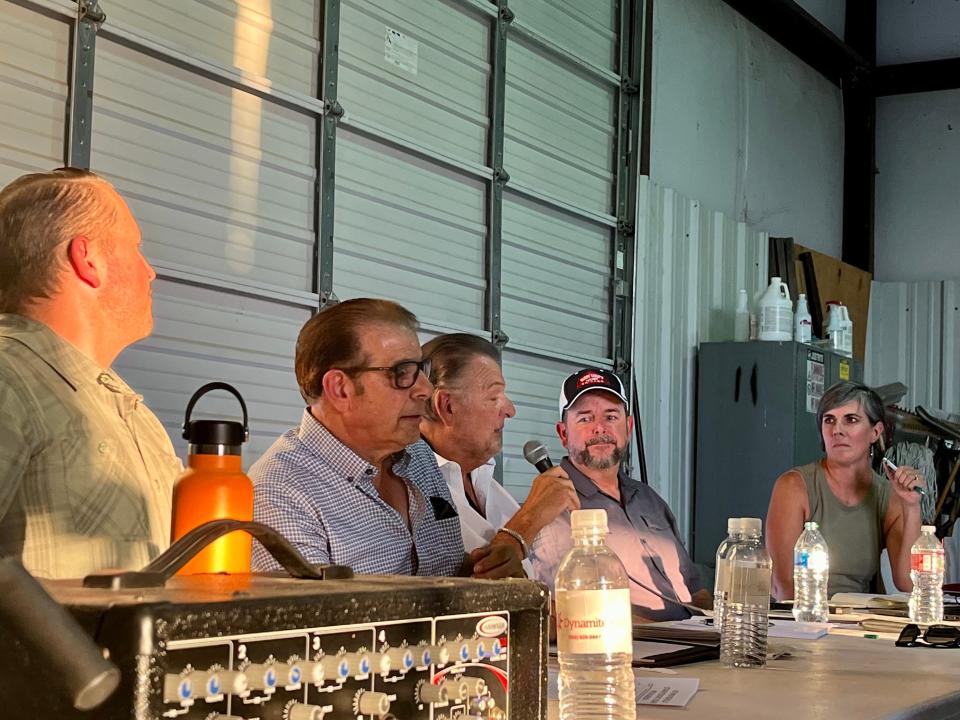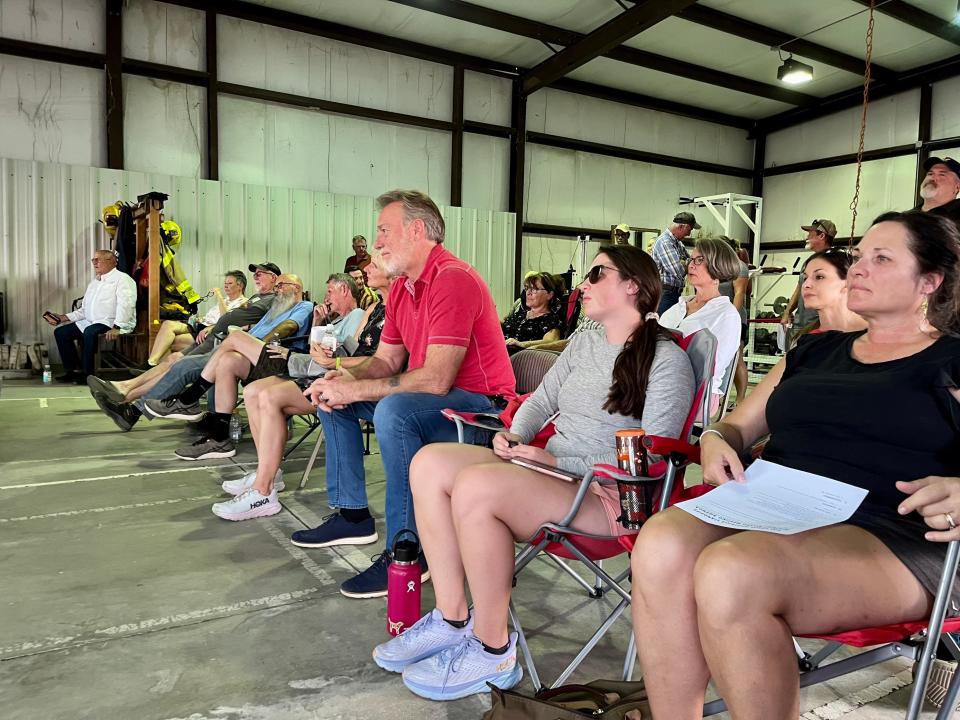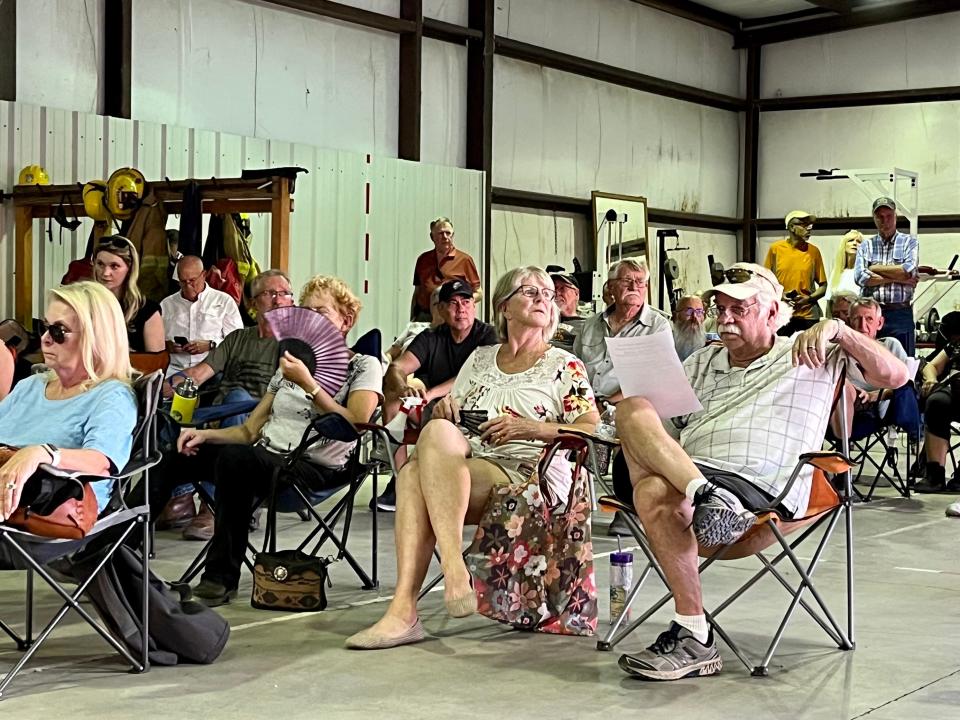Rio Verde Foothills gathers for its first local government meeting on water supply
The newly appointed members of the Rio Verde Foothills Standpipe District — all residents of the unincorporated community where people rely on hauled or well water — estimated that their first meeting would last around an hour and a half, with plenty of time for public comment.
Instead, the meeting wrapped up within roughly 40 minutes, a departure from the norm for a community that has regularly experienced hours-long gatherings where factions intensely debated the potential solutions to their water woes.
Thursday evening's meeting was largely organizational for the leaders of the standpipe district, a new government entity established in June by state lawmakers and Gov. Katie Hobbs. But it represented a shift in tone for the community, which has long been divided over how to get water, especially since Scottsdale cut off its supply at the start of the year.
Some community members now say they're ready to set aside their differences as negotiating a temporary solution to their water supply problem shifts from the hands of politicians to those of Rio Verde Foothills residents.
"The fighting's over," said Rio Verde Foothills homeowner Christy Jackman. "That's the key right there. It's in these guys' hands."
Standpipe district leaders get ready to go to work

The new standpipe district is tasked with entering into agreements to procure water for Rio Verde Foothills' residents temporarily.
Its five appointed leaders, all longtime residents of the Maricopa County community, are:
Meredith DeAngelis, a marketing and public relations executive, was elected chair of the standpipe district on Thursday.
Kent Thomas, a healthcare professional, will serve as vice chair of the district.
Thomas Braun, a retired oil industry employee, is the newly elected secretary of the standpipe district.
Michael Miola, the owner of Silver Spurs Equine, is the standpipe district's treasurer.
Chris Josefowski, a construction management expert.
The standpipe district plans to solicit proposals from water providers, including private water utility Epcor, which is also being considered by the Arizona Corporation Commission to provide the community's long-term water solution. Josefowski will take the lead on that effort, district leaders determined Thursday.
Simultaneously, Thomas will head an attempt to hammer out an agreement with Scottsdale to treat any water the district procures and transport it to a water station near the community.
District leaders are also seeking legal counsel to help negotiate contracts and guide them through the complexities of being an entirely new type of government entity. Miola will head that search.
DeAngelis said she and other standpipe district leaders aim to reconvene in roughly a week to discuss their progress and any proposals they've received from water providers.
Residents express hope

Although few specifics were shared during the district's first meeting, attendees were optimistic that they could soon have access to a water supply for hauling water to their community.
"As far as I'm concerned, it's a start," said resident Leigh Harris. "All of this, for the last two or three years, has been back-and-forth, back-and-forth. I think all of us, from all facets of the community, are just relieved that it's starting."
Still, DeAngelis, the standpipe district chair, told the crowd that she couldn't estimate how long it would take to negotiate agreements.
"I think we all know the million-dollar question," she said. "We're all asking ourselves the same thing, as far as, 'How long does this take?' and 'What does this timeline look like?' and we'll be working through all of that."
Beyond its primary task of finding a stable water supply for the short term, the district has other challenges to overcome.
For instance, there's a debate over whether to hold public meetings virtually because the community lacks a large, air-conditioned gathering space.
Plus, the legislation establishing the standpipe district includes a provision allowing it to serve a maximum of 750 households. That has sparked concern among some residents that more people may want to join the district than is legally allowable.
No government entity tracks water hauling to Rio Verde Foothills, so it's unclear exactly how many homes depend on hauled water. There are about 1,900 households in the community, according to data from the Maricopa Association of Governments, but some homeowners have wells that produce all or some of their water.

DeAngelis said the standpipe district is already considering the 750-household limit and determining how it will impact the community.
Nevertheless, the standpipe district leaders ended the night on a positive note.
"We're gonna get better, and we're gonna do it right," Miola told residents to applause.
Sasha Hupka covers Maricopa County, Pinal County and regional issues for The Arizona Republic. Do you have a tip about a hauled water community? Reach her at sasha.hupka@arizonarepublic.com. Follow her on Twitter: @SashaHupka.
This article originally appeared on Arizona Republic: Rio Verde Foothills has its first local government meeting on water

